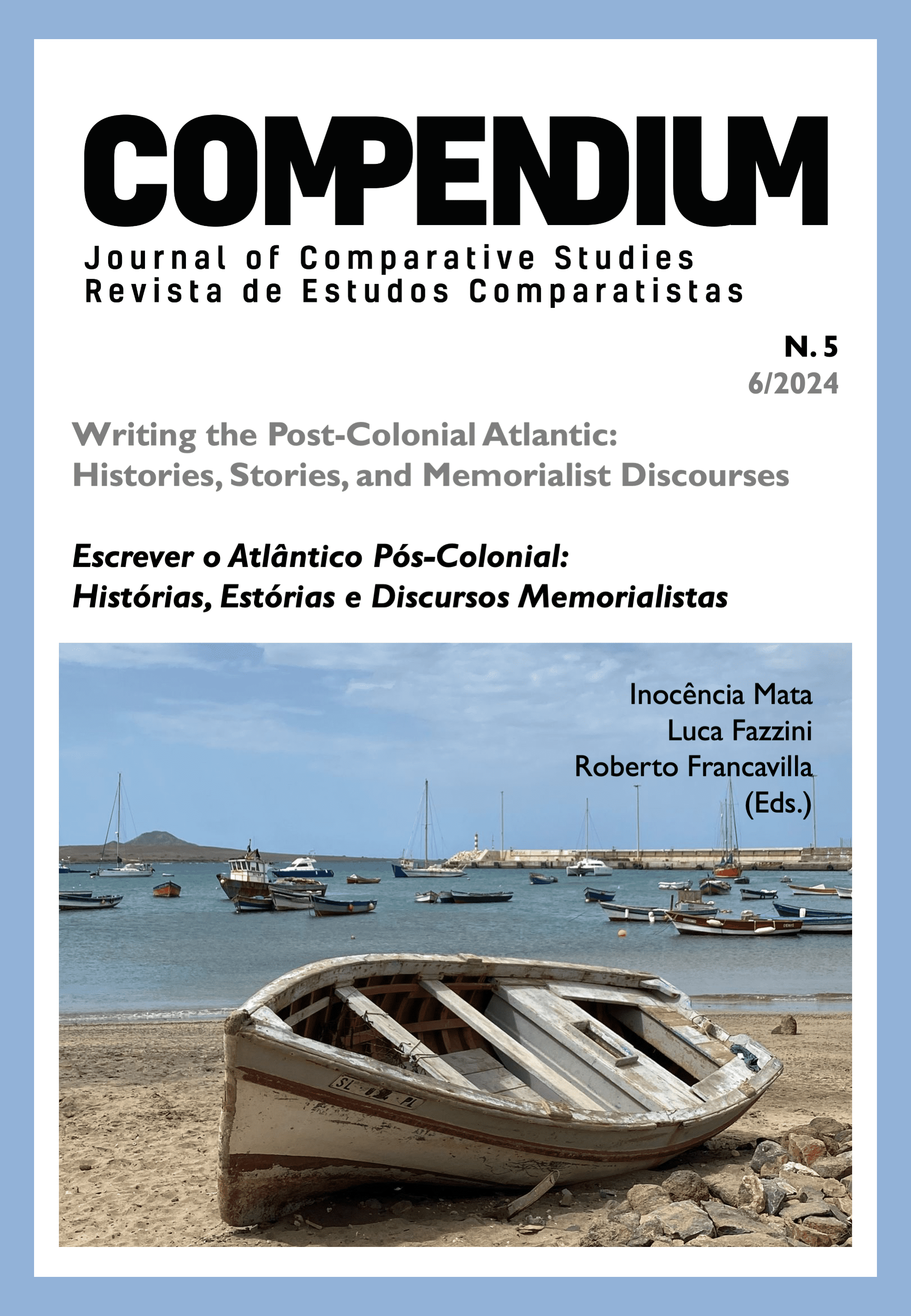Forms of Planetary Criticism in In the Castle of My Skin (1953) by George Lamming
DOI:
https://doi.org/10.51427/com.jcs.2024.05.0007Keywords:
Lamming, In the Castle of my Skin, planetarity, melancholy, modernityAbstract
The novel In the Castle of My Skin (1953) by Barbadian author George Lamming can be reread from a planetary perspective (Spivak 2003; Pratt 2022). In this way, two large areas of inquiry into alterity become evident that link the human with the non-human as forms of resistance to colonial modernity. On the one hand, a planetary melancholy (Apter 2013), which comes into tension with post-imperial melancholy (Gilroy 2004), becomes noticeable in the processes of loss of young G. in the face of the disintegration of the colonial world and childhood from of the emergence of the climatic force, the flood of the first chapter. On the other hand, two forms of criticism within the narrative that warn about the collapse of the colonial world, which are thought through a previous tradition in the character of the Old Man (Jonas 1988) and planetary humanism (Gilroy 2000) in the character of Trumper. These are complex procedures that deactivate the usual readings of the conflicts between nature and culture to reread not only new forms of resistance to the colonial modernity of the 20th century, but also inscribe the work outside the field of World Literature.
Downloads
References
Appiah, Kwame Anthony. 2007. Cosmopolitismo: Ética en un mundo de extraños. Buenos Aires: Katz Editores.
Apter, Emily. 2013. Against World Literature. On the Politics of Untranslatability. London: Verso.
Barnes, Natasha. 2016. “Oral and Popular Cultures in the Caribbean”. En The Novel in Africa and the Caribbean Since 1950, editado por Simon Gikandi, 250-68. New York: Oxford University Press.
Brown, C. T. 1983. “The Myth of the Fall and the Dawning of Consciousness in George Lamming’s In the Castle of My Skin”. World Literature Today 57 (1): 38-43. https://doi.org/10.2307/40138483
Brown, J. Dillon. 2016. “Geographies of Migration in the Caribbean Novel”. En The Novel in Africa and the Caribbean Since 1950, editado por Simon Gikandi, 120-36. New York: Oxford University Press.
Cheah, Pheng. 2016. What is a world?: On postcolonial literature as World Literature. Dur-ham: Duke University Press. https://doi.org/10.1215/9780822374534
Damrosch, David. 2003. What is World Literature? Princeton: Princeton University Press.
Fanon, Frantz. 2015. Los condenados de la tierra. Traducción de Julieta Campos. Ciudad de México: Fondo de Cultura Económica.
Gikandi, Simon. 2016. The Novel in Africa and the Caribbean Since 1950. New York: Ox-ford University Press.
Gikandi, Simon.1992. Writing in Limbo: Modernism and Caribbean Literature. New York: Cornell University Press.
Gilroy, Paul. 2004. After Empire: Melancholia or Convivial Culture? London: Routledge.
Gilroy, Paul. 2000. Between Camps: Nations, Cultures and the Allure of Race. London: Pen-guin Books.
Gilroy, Paul. 1993. The Black Atlantic: Modernity and Double Consciousness. London: Ver-so.
Glissant, Édouard. 2017. Poética de la relación. Traducción de Senda Inés Sferco y Ana Paula Penchaszadeh. Bernal: Editorial de la Universidad Nacional de Quilmes.
Ghosh, Amitav. 2016. The Great Derangement: Climate Change and the Unthinkable. Chicago: University of Chicago Press.
Haraway, Donna. 2016. Staying With the Trouble. Making Kin in the Chthulucene. Dur-ham: Duke University Press.
Jonas, Joyce. E. 1988. “Carnival Strategies in Lamming’s In The Castle of My Skin”. Calla-loo 35, 346-60. https://doi.org/10.2307/2930967
Kom, Ambroise. 1979. “In The Castle of My Skin o George Lamming et les Caraïbes colo-niales”. Présence Africaine, n.º 112: 137-53. https://www.cairn.info/revue-presence-africaine-1979-4-page-137.htm?contenu=resume
Lamming, George. 2017. In the Castle of My Skin. London: Penguin Modern Classics.
Mbembe, Achilles. 2016. Crítica de la razón negra. Buenos Aires: Futuro Anterior.
Mckittrick, Katherine. 2015. Sylvia Wynter: On Being Human as Praxis. Durham: Duke University Press.
Mignolo, Walter. 2005. “La semiosis colonial: La dialéctica entre representaciones fractu-radas y hermenéuticas pluritópicas”. AdVersuS, año II, n.º 3. http://www.adversus.org/indice/nro3/articulos/articulomignolo.htm
Nair, Supriya M. 2016. “The Novel and Decolonization in the Caribbean”. En The Novel in Africa and the Caribbean Since 1950, editado por Simon Gikandi, 55-70. New York: Oxford University Press.
Nixon, Rob. 2011. Slow Violence and the Environmentalism of the Poor. Cambridge, MA: Harvard University Press.
Ngũgĩ, Mukoma. 2018. The Rise of the African Novel. Michigan: University of Michigan Press.
Odhiambo, Christopher. 1994. “Outside the Eyes of the Other: George Lamming and Defi-nition in Of Age and Innocence”. Research in African Literatures 25 (2): 121-30.
Ortiz, Fernando. 1987. Contrapunteo cubano del tabaco y el azúcar. Caracas: Biblioteca Ayacucho.
Pratt, Mary Louise. 2022. Planetary Longings. Durham: Duke University Press.
Pratt, Mary Louise. 2018. Los imaginarios planetarios. Traducción de Lina Meruane. Ma-drid: Aluvión.
Rahming, M. B. 1983. “Complacency and Community: Psychocultural Patterns in the West Indian Novel”. CLA Journal 26 (3): 288-302.
Rama, Ángel. 2007. Transculturación narrativa en América Latina. Buenos Aires: Edicio-nes El Andariego.
Rodríguez, Emilio Jorge. 1979. “Estudio crítico” en El castillo en mi piel. La Habana: Casa de las Américas.
Spivak, Gayatri C. 2003. Death of a Discipline. New York: Columbia University Press.
Stecher Guzmán, Lucía. 2014. “El lugar de África en el pensamiento anticolonial de George Lamming y Kamau Brathwaite”. En África/América: Literatura y Colonialidad, edi-tados por Ana Pizarro y Carolina Benavente, 174-90. Ciudad de México: Fondo de Cultura Económica.
Thiong’o, Ngũgĩ Wa. 2008. “Freeing the Imagination”. Transition 100: 164-9.
Thiong’o, Ngũgĩ Wa. 1992. Decolonizing the Mind: The Politics of Language of African Lite-rature. Nairobi: East African Publishers.
Wynter, Sylvia. 1971. “Novel and history, Plot and Plantation”. Savacou 5: 95-102.
Wynter, Sylvia. S.d. “Black Metamorphosis: New Natives in a New World”. Institute of the Black World Records, MG 502, Box 1. Schomburg Center for Research in Black Cultu-re.
Yusoff, Kathryn. 2018. A Billion Black Anthropocenes or None. Minneapolis: University of Minnesota Press.
Downloads
Published
How to Cite
Issue
Section
License
Copyright (c) 2024 Benjamín Alías

This work is licensed under a Creative Commons Attribution 4.0 International License.
Compendium embraces online publishing and open access to all issues. Authors retain copyright and grant the journal right of first publication with the work simultaneously licensed under a Creative Commons Attribution 4.0 International (CC BY 4.0), that allows others to share the work with an acknowledgement of the work's authorship and initial publication in this journal.











